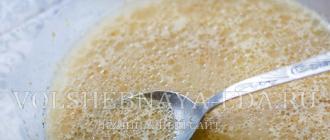. Hear, Lord, my truth.
These words are filled with great confidence. The Psalmist here mentions truth not to praise himself, and not because he pretends to be a righteous man, but as if he were saying: since I rightly ask for Your help, and I want to get rid of what I suffer unjustly, persecuted by Saul for no reason, then hear and fulfill my request.
Instill my prayer not in flattering lips,
- because God listens to the prayer not of flattering lips, but of a pure tongue and accustomed to learn from the words of God.
. From Your presence my destiny will come.
He clearly prays that the Only Begotten will be his judge.
My eyes see what is right.
To ask the Son for righteous judgment, as He judged us.
. Thou hast tempted my heart, thou hast visited me at night: thou hast tempted me, and iniquity is not found in me.
It is common to call blasphemy against God an untruth to the Divine Scripture. For it is said: “a lie as tall as a verb” ().
. For let not my mouth speak of the deeds of men.
He also teaches us to be careful not to say anything mortal or human.
For the words of Your lips I have preserved the cruel ways.
According to Your commandments I entered into the narrow and straitened gates.
. Make my steps in Your paths.
This word teaches us not to rely on ourselves, but to establish ourselves in God. “The path and” of the Lord are the observance of the commandments.
. I cried out, because you heard me, O God.
It is said: “thou hast heard” - instead of: “thou shalt hear.” It was not in vain that I appealed to You, but having experienced Your love for mankind through experience; because I was often heard by You, calling You. “Appeal” is a thought directed towards God.
Incline Your ear to me.
God is all ears, because He hears everything.
. Close your shutter here.
The word "fat" ( Church) – fat. Editorial office of "ABC of Faith" means very great prosperity for the enemies.
. Turn your eyes to the ground.
They, he says, had one goal: to attract, no matter how it is, to the earth and incline to carnal wisdom.
. Your weapon is from the enemy of Your hands.
The soul of a righteous person, especially one who attracts sinners from wickedness to godliness, is like a sword sharpened against the spirits of evil. This sword, which You, the Lord, sharpened against Your enemies, “Deliver... from your enemy’s hand” (). Who are the enemies of the hand of God if not those who resist faith in the Only Begotten of God, Who is also the hand of God?
. Lord, I have divided the earth from the little ones.
He prays that the wicked will be excommunicated and, as it were, separated from the little ones. Who are these “little ones” if not those about whom it is said: “many... the essence of the title, few are chosen” ()?
And their belly is filled with Your hidden ones.
They, he says, enjoyed everything honorable; and therefore, they have reached such contempt that they are lawless. The words are: "Thy hidden ones"- mean: with those secret punishments, of which You have knowledge and which I do not know, fill their bellies or, to be precise, fill them themselves.
Having had enough of her sons, she left the remains of her child.
They were filled with all kinds of iniquity and passed it on to their children, even leaving their sons to their babies, that is, to their grandchildren.
. I will appear before Your face in righteousness.
I will not be like them, and I will not be satisfied with what they are satisfied with, but I will be filled with Your glory through righteous deeds.
Sorry, your browser does not support viewing this video. You can try downloading this video and then watch it.
Interpretation of Psalm 16
As follows from the inscription preceding the psalm, it was in the mouth of David his prayer to the Lord; written in distressing circumstances. Much of its content can be perceived as an indication that this psalm poured out from the heart of David, who was extremely tired of the hatred of King Saul, who was hunting him.
A. The Prayer of the Righteous (16:1-5)
Ps. 16:1-2. With a thrice repeated appeal: Hear, Lord... listen... accept the prayer - David emphasizes that his need for the Lord’s help is urgent. Hear about my just cause (about “truth”) from lips that do not lie to You, the psalmist cries.
In verse 2, he asks that the “sentence” (judgment) on him and (implied) his enemies be pronounced by the Lord Himself, who, David hopes, sees that he is right.
Ps. 16:3-5. The first phrase of verse 3 can be taken as an image of the disasters (attacks, betrayals) that constantly threatened David and his followers; but perhaps the psalmist meant something specific that happened “one night,” which he perceived as a test, a “temptation” from above. But, David claims, You could be convinced that I remained faithful to You: my lips do not depart from my thoughts.
And in business - in everything that concerns everyday human life, with its affections, passions, temptations - David acted according to the word of the Lord (verse 4). What may also be meant here is that, having been anointed to the throne of Israel by God’s decision, David kept himself from the temptation to take “the path of the oppressor,” but remained loyal and fair to those around him, and, most importantly, did not strive for the violent overthrow of Saul .
In verse 5, he asks that the Lord will help him to stay in these ways that are pleasing to Him, so that David’s feet do not falter in them.
B. Prayer for protection and protection (16:6-12)
Ps. 16:6-7. Urgently asking God for help, which speaks of the extremity of his situation at that time, David trusts in His wondrous mercy, that is, in the miraculous deliverance of His chosen one from those who resist the right hand of God (God's anointing of David). In English translated, this verse sounds slightly different: “Show Your wonderful mercy, You who save those who trust in You right hand by Thy (right hand), from those who rebel against them."
Despite partial discrepancies, both “resisting” and “rebelling” are quite consistent with King Saul and his entourage.
Ps. 16:8-10. Continuation of the same prayer. David's enemies were enclosed in their fat (verse 10), that is, they were overgrown with fat; insensitive to the needs of the people, they live for their own pleasure, arrogant in their thoughts and words.
Ps. 16:11-12. In verse 11, David refers to the cunning, cunning tactics of the enemies around him; they stop at nothing in their desire to put an end to him (“throw him down to the ground”). In these attempts of theirs, he likens them to bloodthirsty lions (“skimn” - young lion), lying in wait for their prey in a “shelter” and pouncing on it suddenly.
Ps. 16:13-15. Warn them... Lord (verse 13), that is, “do not let their plans come true.” The psalmist asks to be delivered from people who live only in the interests of worldly life, alien to spiritual needs. Despite the fact that the Lord does not prevent them from being satisfied and becoming rich (You fill their bellies, so that both their children and grandchildren will have plenty), they strive to become more and more established in the world and for the sake of their purely earthly interests they pursue David.
Forced to lead a “nomadic” lifestyle, David could not at that time worship God in the tabernacle; he dreams of the time when this will become possible for him, so that in his rightness he can look at the face of God and be satisfied with His image (verse 15).
Psalm 16 is one of a number of songs that were written by King David at a time when Saul still sat on the throne of Israel and sought his death. Those songs are distinguished by despair, which can be seen through the lines, because then all the supporters and associates of Saul took up arms against the psalmist, and help could only be found in the Lord.
History of writing
The inscription of the text indicates that the psalm was written by the hand of David himself, this is confirmed by the original Hebrew and the Greek translation of the Psalter. In its content, Psalm 16 is a prayer to God with a request to deliver the author from trials. Just like in the texts of this period, in song 16 the author explains his innocence to listeners and readers.
In Psalm 16, David hopes that the Lord will hear him and be just.
A large number of songs from this period allow us to conclude that the persecution was long-lasting - Saul did not want to retreat and pursued his servant long and stubbornly.
Interpretation of the Psalm
The psalmist considers the Lord to be his only defense, whom he calls to speak in his defense and judge. Each verse of the psalm is an appeal to the Almighty:
 Important! The entire psalm is the psalmist's clearly expressed hope in God. He understands that only the Almighty can save him from troubles and persecution and give him a quiet and serene life.
Important! The entire psalm is the psalmist's clearly expressed hope in God. He understands that only the Almighty can save him from troubles and persecution and give him a quiet and serene life. Reading rules
Reading the psalm in the temple Church Slavonic language, the Christian must understand that this is a beautiful prayer:
Hear, O Lord, my truth, attend to my prayer, inspire my prayer not in flattering lips. From Your presence my destiny will come; let my eyes see righteousness. You have tempted my heart, you have visited me at night, you have tempted me, and iniquity is not found in me. For let not my mouth speak of the deeds of men; for the words of Thy lips I have preserved the ways of cruelty. Make my steps in Your paths, so that my steps may not move. I cried out, for Thou hast heard me, O God, incline Thy ear to me and hear my words. Surprise Your mercy, save those who trust in You from those who resist Your right hand. Save me, O Lord, like the apple of your eye, and cover me in the shelter of Your wing. On behalf of the wicked, who have made me angry, conquer my soul. You shut up your fat, and their lips spoke pride. Those who cast me out have now passed me by, and have cast their eyes upon the earth. Having embraced me like a lion ready to catch, and like a skiman who dwells in the secret. Arise, O Lord, before me, and stifle them, deliver my soul from the wicked, Thy weapon from the enemy of Thy hand. Lord, I divided them from the little ones from the earth, and filled their bellies with Thy hidden ones, being satisfied with the sons, and leaving the remains as my infant. But I will appear before Your face with righteousness, I will be satisfied, and I will always show Your glory to me.
First, you should analyze your life, because David confirms that he led a righteous lifestyle and did not hold a grudge against his enemy. He completely denies his guilt, because he is confident that he lived righteously and fulfilled the law of God. He then encourages readers to watch their words and lives, not giving room for sin. Next, he sets out his problem - persecution by enemies and only then asks God to help.
In order to understand better prayer David must read the psalm in Russian:
1 Hear, O Lord, [my] truth, listen to my cry, accept my prayer from the lips of the untruthful.
2 Let judgment come to me from Your presence; let Thy eyes look upon righteousness.
3 You tried my heart, you visited me by night, you tempted me and found nothing; My lips do not depart from my thoughts.
4 In the affairs of men, according to the word of Your mouth, I have kept myself from the ways of the oppressor.
5 Establish my steps in Your ways, so that my feet do not falter.
6 I cry to You, for You will hear me, O God; incline Your ear to me, hear my words.
7 Show Your wondrous mercy, O Savior of those who trust [in You] from those who resist Your right hand.
8 Guard me like the apple of your eye; shelter me in the shadow of your wings
9 From the presence of the wicked who attack me, from the enemies of my soul who surround me:
10 They are wrapped up in their fat, they speak arrogantly with their lips.
11 They surround us now at every step we take; they fixed their eyes to cast me down to the ground;
12 They are like a lion thirsty for prey, like a skim sitting in hidden places.
13 Arise, O Lord, warn them, bring them down. Deliver my soul from the wicked by Your sword,
14 from people - by Your hand, O Lord, from the people of the world, whose portion is in this life, whose bellies You fill from Your treasures; their sons are satisfied and will leave the remainder to their children.
15 But I will look upon Your face in righteousness; Having awakened, I will be saturated with Your image.
You can use the interpretations of the holy fathers or Professor Lopukhin. It is recommended to read the text:
- during difficult trials;
- when it is necessary to protect yourself from enemies and persecution;
- during troubles and problems;
- for protection.
Psalter. Psalm 16
1 David's Prayer. Hear, O Lord, the truth, listen to my cry, accept the prayer from the lips of the truthful.
2 Let judgment come to me from Your presence; let Thy eyes look upon righteousness.
3 You tried my heart, you visited me by night, you tempted me and found nothing; My lips do not depart from my thoughts.
4 In the affairs of men, according to the word of Your mouth, I have kept myself from the ways of the oppressor.
5 Establish my steps in Your ways, so that my feet do not falter.
6 I cry to You, for You will hear me, O God; incline Your ear to me, hear my words.
7 Show Your wondrous mercy, O Savior of those who trust at you from those who resist Your right hand.
8 Guard me like the apple of your eye; shelter me in the shadow of your wings
9 From the presence of the wicked who attack me, from the enemies of my soul who surround me:
10 They are wrapped in their fat, they speak arrogantly with their lips.
11 They surround us now at every step we take; they fixed their eyes to overthrow me to the ground;
12 They are like a lion thirsty for prey, like a skim sitting in hidden places.
13 Arise, O Lord, warn them, bring them down. Deliver my soul from the wicked by Your sword,
15 But I will look upon Your face in righteousness; Having awakened, I will be saturated with Your image.
Interpretation of Psalm 16
As follows from the inscription preceding the psalm, it was in the mouth of David his prayer to the Lord; written in distressing circumstances. Much of its content can be perceived as an indication that this psalm poured out from the heart of David, who was extremely tired of the hatred of King Saul, who was hunting him.
A. The Prayer of the Righteous (16:1-5)
Ps. 16:1-2. With a three-fold repeated appeal: Hear, Lord... listen... accept the prayer - David emphasizes that his need for the Lord’s help is urgent. Hear about my just cause (about “truth”) from lips that do not lie to You, the psalmist cries.
In verse 2, he asks that the “sentence” (judgment) on him and (implied) his enemies be pronounced by the Lord Himself, who, David hopes, sees that he is right.
Ps. 16:3-5. The first phrase of verse 3 can be taken as an image of the disasters (attacks, betrayals) that constantly threatened David and his followers; but perhaps the psalmist meant something specific that happened “one night,” which he perceived as a test, a “temptation” from above. But, David claims, You could be convinced that I remained faithful to You: my lips do not depart from my thoughts.
And in business - in everything that concerns everyday human life, with its affections, passions, temptations - David acted according to the word of the Lord (verse 4). What may also be meant here is that, having been anointed to the throne of Israel by God’s decision, David kept himself from the temptation to take “the path of the oppressor,” but remained loyal and fair to those around him, and, most importantly, did not strive for the violent overthrow of Saul .
In verse 5, he asks that the Lord will help him to stay in these ways that are pleasing to Him, so that David’s feet do not falter in them.
B. Prayer for protection and protection (16:6-12)
Ps. 16:6-7. Urgently asking God for help, which speaks of the extremity of his situation at that time, David trusts in His wondrous mercy, that is, in the miraculous deliverance of His chosen one from those who resist the right hand of God (God's anointing of David). In English translated, this verse sounds slightly different: “Show Your wondrous mercy, You who save those who trust in You with Your right hand (right hand) from those who rise up against them.”
Despite partial discrepancies, both the “resisters” and “rebels” are quite consistent with King Saul and his entourage.
Ps. 16:8-10. Continuation of the same prayer. David's enemies were enclosed in their fat (verse 10), that is, they were overgrown with fat; insensitive to the needs of the people, they live for their own pleasure, arrogant in their thoughts and words.
Ps. 16:11-12. In verse 11, David refers to the cunning, cunning tactics of the enemies around him; they stop at nothing in their desire to put an end to him (“throw him down to the ground”). In these attempts of theirs, he likens them to bloodthirsty lions (“skimn” - young lion), lying in wait for their prey in a “shelter” and pouncing on it suddenly.
Ps. 16:13-15. Warn them... Lord (verse 13), that is, “do not let their plans come true.” The psalmist asks to be delivered from people who live only in the interests of worldly life, alien to spiritual needs. Despite the fact that the Lord does not prevent them from being satisfied and becoming rich (You fill their bellies, so that both their children and grandchildren will have plenty), they strive to become more and more established in the world and for the sake of their purely earthly interests they pursue David.
Forced to lead a “nomadic” lifestyle, David could not at that time worship God in the tabernacle; he dreams of the time when this will become possible for him, so that in his rightness he can look at the face of God and be satisfied with His image (verse 15).






